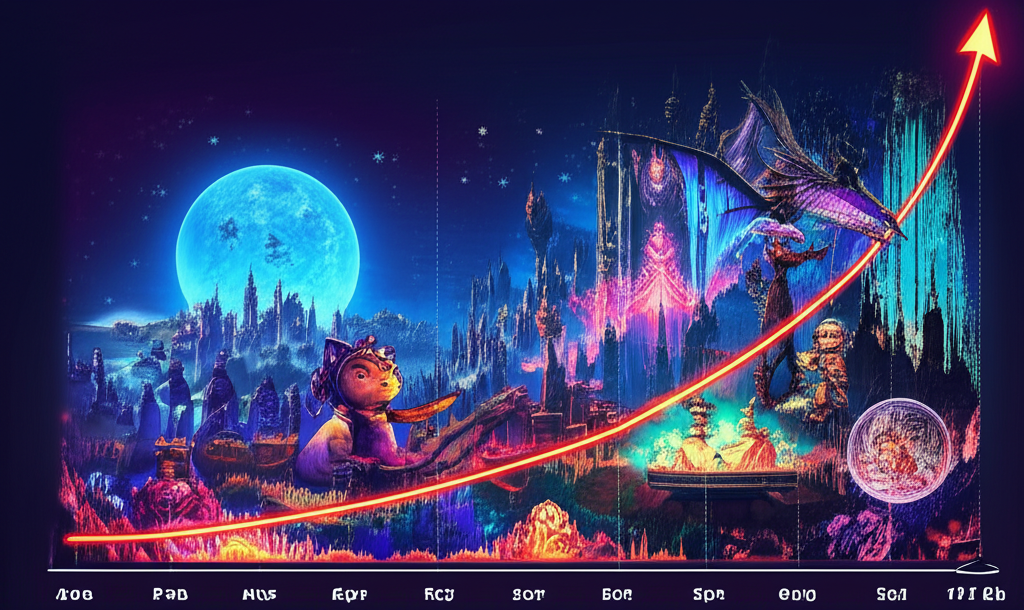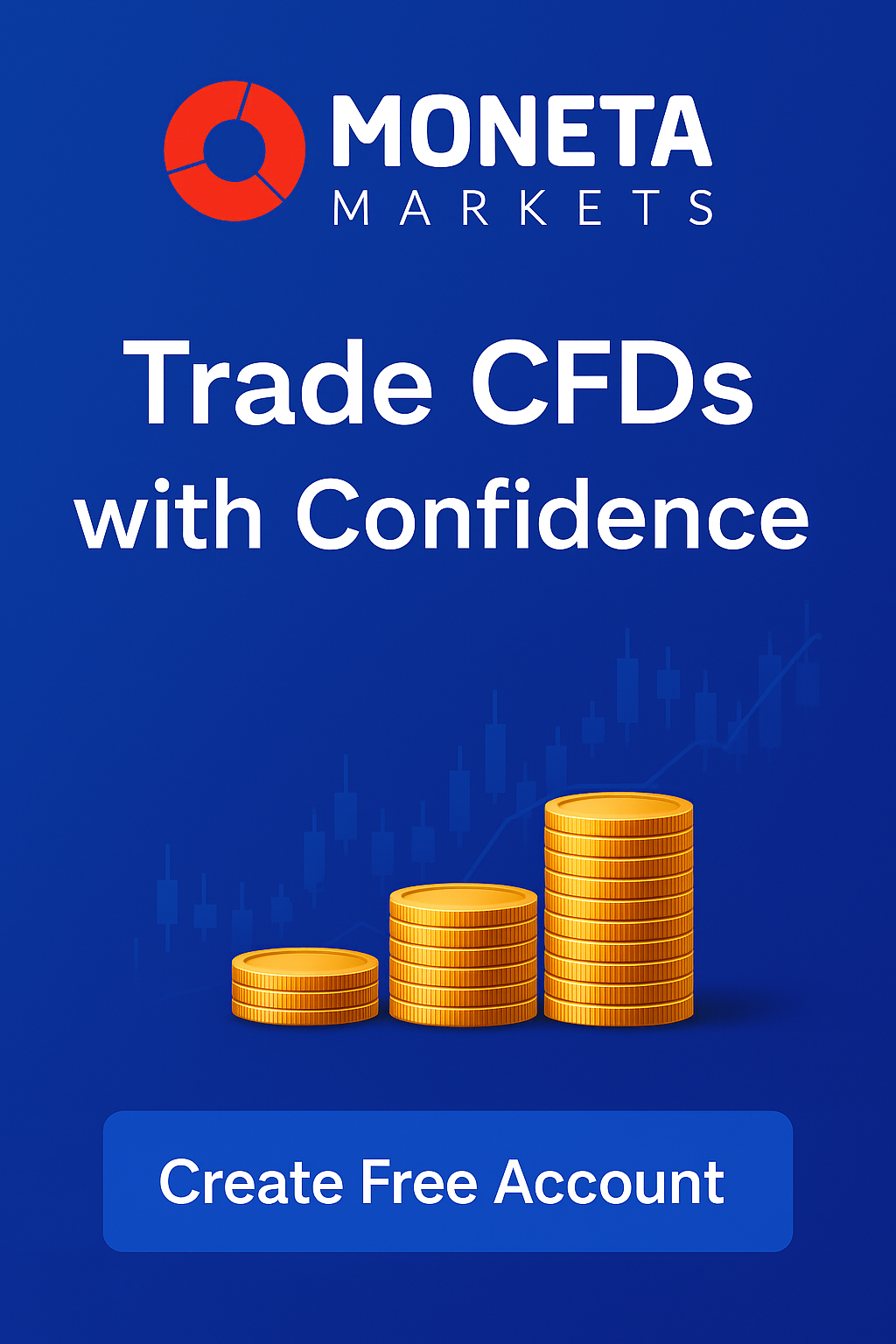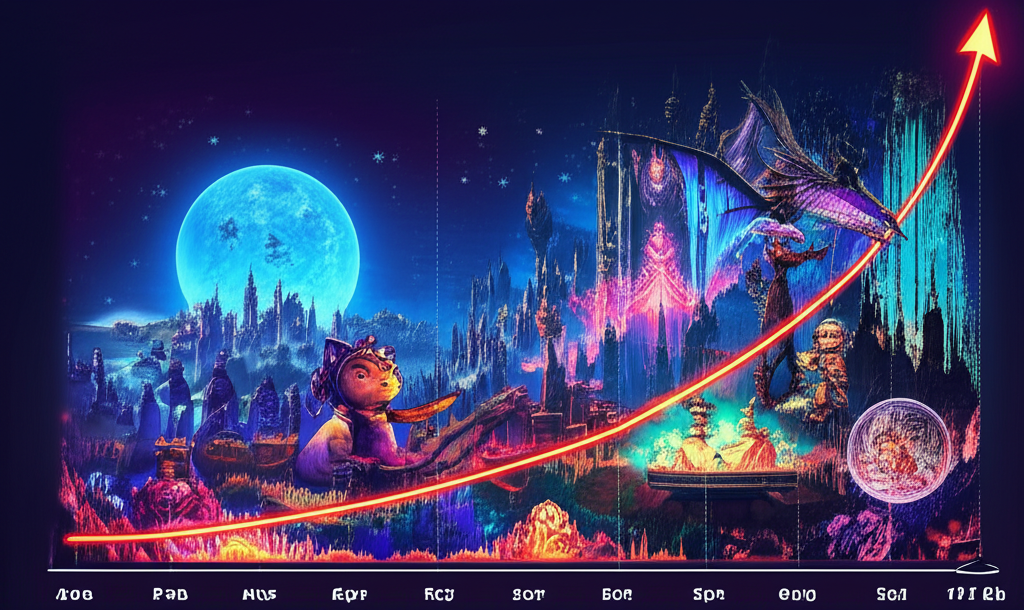What Are Gaming ETFs and Why Invest in Them in the United States for 2025?

The video game and esports industries have surged from niche pastimes into mainstream cultural and financial powerhouses, rivaling traditional entertainment sectors like film and music. For U.S. investors, this evolution presents a strategic opportunity-not through picking individual stocks, but by leveraging Exchange-Traded Funds (ETFs) that provide diversified exposure to the broader gaming ecosystem. As we approach 2025, the digital entertainment landscape is being reshaped by cloud infrastructure, mobile dominance, and immersive technologies, making gaming ETFs a compelling addition to forward-looking portfolios.
Gaming ETFs are thematic funds that pool investments in companies tied to video game development, hardware manufacturing, esports operations, streaming platforms, and enabling technologies such as GPUs and game engines. These funds allow investors to gain broad exposure to the sector’s growth without the risk of betting on any single company. The U.S. remains a central hub for gaming innovation, home to major players like Microsoft (Xbox), NVIDIA, and Activision Blizzard, and offers a liquid, regulated market for ETF trading on platforms like the NYSE and Nasdaq.
Several forces are converging to accelerate the industry’s expansion heading into 2025:
- Esports Growth: Competitive gaming now fills stadiums and streams to millions, with major leagues and sponsorships turning pro gamers into global celebrities. Revenue from media rights, advertising, and merchandise continues to climb.
- Mobile Gaming Supremacy: Smartphones have become the most accessible gaming devices worldwide, with titles like Candy Crush and PUBG Mobile generating billions in annual revenue.
- Cloud Gaming Momentum: Services like Xbox Cloud Gaming and NVIDIA GeForce Now eliminate the need for expensive consoles, expanding access and enabling subscription-based monetization.
- Metaverse and Persistent Worlds: While still evolving, virtual environments powered by gaming technology are attracting serious investment, particularly from tech giants exploring digital identity and virtual economies.
- AI and Procedural Content: Artificial intelligence is streamlining game development and personalizing player experiences, reducing production costs while increasing engagement.
For U.S. investors, this confluence of innovation and consumer demand makes gaming ETFs an attractive way to capitalize on long-term digital transformation-especially as new console cycles mature and cloud infrastructure reaches critical scale.
Global Gaming and Esports Market Outlook for U.S. Investors in 2025

The global gaming market is on track to surpass $200 billion in annual revenue by 2025, according to industry analysts. This growth is fueled by a global user base exceeding three billion, with North America remaining one of the most lucrative regional markets. For U.S. investors, the significance lies not just in domestic companies but in the global reach of American tech and gaming firms-many of which are key holdings in top gaming ETFs.
Beyond raw revenue, emerging trends are redefining how value is created in the industry:
- AI Integration: From dynamic NPCs to automated testing and voice synthesis, AI is becoming embedded in every layer of game development. Companies like Unity and Epic Games are integrating machine learning tools to speed up production and enhance realism.
- VR and AR Expansion: While still a smaller segment, virtual and augmented reality gaming are gaining traction with new hardware like Meta’s Quest 3 and Apple’s Vision Pro. Long-term, these platforms could redefine interactive entertainment.
- Blockchain and Web3 Gaming: Despite market skepticism, blockchain-based games offering true digital asset ownership via NFTs continue to attract venture capital. While regulatory scrutiny remains high-especially in the U.S.-this space could evolve with clearer frameworks.
- Subscription Services: Xbox Game Pass, PlayStation Plus, and EA Play are shifting consumer behavior from one-time purchases to recurring access models, creating predictable revenue streams for publishers and platform holders.
U.S. companies are central to this transformation. NVIDIA’s GPUs power both gaming and AI development, Microsoft’s acquisition of Activision Blizzard strengthens its position in game publishing and cloud gaming, and Roblox continues to pioneer user-generated content platforms. These firms not only drive innovation but also influence the composition and performance of gaming ETFs traded in the U.S.
However, investors should remain mindful of macroeconomic factors. Inflation, interest rate fluctuations, and changes in consumer discretionary spending can impact short-term performance. Gaming is often seen as a discretionary expense, meaning demand may soften during economic downturns. Still, the long-term trajectory-driven by technological adoption and global digitalization-remains strong.
Top Gaming and Esports ETFs for U.S. Investors in 2025
For American investors, a handful of ETFs offer targeted exposure to the gaming and esports sectors. Each fund varies in strategy, geographic focus, and underlying holdings, allowing for tailored portfolio integration. Below is a detailed comparison of the leading options available on U.S. exchanges.
| Ticker | ETF Name | Investment Objective | Top 5 Holdings (Illustrative) | Expense Ratio | AUM (Approx.) | Inception Date | Historical 3-Year Perf. (Annualized, Illustrative) |
|---|---|---|---|---|---|---|---|
| ESPO | VanEck Video Gaming and eSports ETF | Tracks companies involved in video game development, esports, and related hardware/software. Focuses on pure-play companies. | NVIDIA Corp, Tencent Holdings, Activision Blizzard, Nintendo Co Ltd, Electronic Arts Inc. | 0.55% | ~$3.5B | Oct 16, 2018 | ~12-15% |
| HERO | Global X Video Games & Esports ETF | Invests in companies that develop or publish video games, facilitate esports, or produce related hardware/software. | Nintendo Co Ltd, Electronic Arts Inc, Unity Software Inc, Take-Two Interactive Software Inc, Roblox Corp. | 0.50% | ~$1.5B | Oct 29, 2019 | ~10-13% |
| GAMR | Amplify Video Game Tech and Esports ETF | Provides exposure to a global portfolio of companies in the video game and esports industries across various segments (publishers, hardware, platforms). | Roblox Corp, Sea Ltd, Nintendo Co Ltd, Tencent Holdings, Vizio Holding Corp. | 0.70% | ~$300M | Sep 8, 2016 | ~8-11% |
| BETZ | Roundhill Sports Betting & iGaming ETF | Focuses on companies involved in sports betting and iGaming (online gambling). Distinct from pure video game development. | DraftKings Inc, Flutter Entertainment plc, MGM Resorts International, Penn Entertainment Inc, Entain plc. | 0.75% | ~$200M | Jun 4, 2020 | ~5-8% |
Note: Data points such as AUM and performance are illustrative and based on historical trends leading up to 2025. Past performance is not indicative of future results. Expense ratios are subject to change. Investors should consult the most recent prospectus and fact sheets for current information.
VanEck Video Gaming and eSports ETF (ESPO)
ESPO is widely regarded as the most focused and liquid gaming ETF available to U.S. investors. It tracks the MVIS Global Video Gaming and eSports Index, which emphasizes companies deriving at least half their revenue from gaming or esports. This “pure-play” mandate results in a concentrated portfolio of industry leaders like NVIDIA, whose graphics chips are essential to modern gaming, and Tencent, the Chinese tech giant with stakes in Riot Games, Epic, and numerous mobile publishers.
Activision Blizzard, now under Microsoft, remains a top holding due to its franchises like Call of Duty and World of Warcraft. Nintendo’s inclusion reflects its enduring brand strength and hybrid console model. With $3.5 billion in assets under management and a 0.55% expense ratio, ESPO offers strong liquidity and has historically outperformed broader tech indices during gaming bull markets.
Global X Video Games & Esports ETF (HERO)
HERO takes a slightly broader approach, targeting companies that benefit from the rising popularity of gaming and competitive esports. Its strategy includes game developers, publishers, and supporting technology firms such as Unity Software, which provides a widely used game engine. Unlike ESPO, HERO doesn’t require a strict revenue threshold, allowing it to include firms with significant but non-majority gaming exposure.
Top holdings include Nintendo, Electronic Arts, and Roblox, all of which appeal to investors seeking exposure to both console and user-generated content platforms. At 0.50%, HERO has the lowest expense ratio among major gaming ETFs, making it a cost-efficient option for long-term investors. With $1.5 billion in AUM, it’s also one of the most traded in the sector.
Amplify Video Game Tech and Esports ETF (GAMR)
GAMR tracks the VTECS Video Game Tech and Esports Index and casts a wider net across the gaming value chain. It includes not only developers and publishers but also hardware manufacturers and platforms that support gaming content. This broader mandate results in holdings like Sea Ltd, the parent of Garena, a major Southeast Asian game publisher, and Vizio, included for its smart TV gaming features.
Roblox is a top holding, reflecting the platform’s role in the creator economy. While GAMR’s 0.70% expense ratio is higher than ESPO and HERO, its diversified global exposure offers a different risk-return profile. With $300 million in AUM, it’s smaller and less liquid, which may affect trading efficiency for some investors.
Roundhill Sports Betting & iGaming ETF (BETZ)
BETZ stands apart by focusing exclusively on the online gambling and sports betting sectors-a space that’s expanded rapidly in the U.S. due to state-level legalization. While not a traditional gaming ETF, it’s often grouped with them due to overlapping digital engagement and technology infrastructure.
Holdings include DraftKings, FanDuel’s parent Flutter Entertainment, and MGM Resorts, all of which operate regulated betting platforms. The fund’s 0.75% expense ratio is the highest on the list, and its performance is more sensitive to regulatory shifts and consumer spending on gambling than to game development trends. Investors should treat BETZ as a complementary, not core, holding in a gaming-themed portfolio.
Moneta Markets and Regulatory Considerations
For U.S. investors exploring international brokerage options, it’s important to note that Moneta Markets is a globally recognized platform that holds an FCA license, ensuring compliance with stringent European financial regulations. It does not hold an ASIC license. While U.S. investors typically use domestic brokers like Fidelity or Schwab for ETF trading, those considering offshore access should verify regulatory alignment and tax implications.
Is There a Vanguard Gaming ETF?
Many U.S. investors familiar with Vanguard’s low-cost, broad-market index funds often ask whether a “Vanguard Gaming ETF” exists. As of 2025, Vanguard does not offer a dedicated gaming or esports ETF. The firm’s investment philosophy prioritizes broad diversification and low turnover, avoiding highly concentrated thematic funds. Investors seeking gaming exposure through Vanguard would need to rely on broader technology or growth ETFs-such as the Vanguard Information Technology ETF (VGT)-which may include Microsoft, Apple, or NVIDIA, but not pure-play gaming companies.
How to Choose the Right Gaming ETF for Your U.S. Portfolio in 2025
Selecting the best gaming ETF requires aligning fund characteristics with your investment goals, risk tolerance, and portfolio strategy. Here’s what to consider:
- Expense Ratio: Lower fees mean more of your returns stay invested. HERO (0.50%) and ESPO (0.55%) lead in cost efficiency.
- Assets Under Management (AUM): Higher AUM generally means better liquidity and tighter bid-ask spreads. ESPO’s $3.5 billion makes it the most liquid, followed by HERO.
- Holdings and Diversification: ESPO and HERO focus on core gaming players, while GAMR includes more peripheral tech. BETZ is a niche play on iGaming.
- Pure-Play vs. Diversified Exposure: If you want direct exposure to gaming innovation, ESPO and HERO are stronger choices. GAMR offers broader tech exposure, which may reduce volatility but dilute thematic focus.
- International Exposure: Many top holdings-like Tencent and Nintendo-are non-U.S. companies, introducing currency risk. ETFs like ESPO and GAMR have significant international allocations.
- Investment Horizon: Gaming ETFs are best suited for long-term investors. Short-term traders may face volatility from earnings reports, game launches, or regulatory news.
Ultimately, the choice depends on whether you’re building a core satellite position around digital entertainment or supplementing a broader tech allocation.
Risks and Considerations for U.S. Investors in Gaming ETFs
While the growth potential is substantial, gaming ETFs come with notable risks that U.S. investors should evaluate:
- Volatility: As a growth-oriented sector, gaming stocks can be highly sensitive to market sentiment, economic shifts, and interest rate changes.
- Concentration Risk: Thematic ETFs are inherently less diversified than broad-market funds, making them vulnerable to sector-specific downturns.
- Regulatory Risk: Especially for BETZ, changes in online gambling laws-either at the state or federal level-could impact profitability and market access.
- Technological Disruption: The gaming industry moves fast. Companies that fail to innovate-like those slow to adopt mobile or cloud-can lose relevance quickly.
- Currency Risk: ETFs with significant foreign holdings (e.g., Tencent, Nintendo) are exposed to USD exchange rate fluctuations, which can erode returns.
- Geopolitical Exposure: Global supply chains, data privacy laws, and cross-border regulations can affect operations, particularly for Asian-based firms.
Investors should treat gaming ETFs as tactical, high-conviction holdings rather than core portfolio components.
How to Invest in Gaming ETFs: A Step-by-Step Guide for U.S. Investors
Getting started with gaming ETFs is straightforward for U.S.-based investors:
1. Choose a Regulated Brokerage: Open an account with a U.S.-based, SEC- and FINRA-regulated platform such as Fidelity, Charles Schwab, E*TRADE, or Interactive Brokers.
2. Fund Your Account: Link your bank account and deposit funds into a taxable brokerage account or IRA.
3. Research and Select: Use your broker’s research tools to compare ESPO, HERO, GAMR, and BETZ based on fees, holdings, and performance.
4. Place Your Trade: Search for the ETF by ticker, decide on the number of shares, and place a market or limit order.
5. Monitor and Rebalance: Review your position periodically, especially after major industry events like earnings reports or new game launches.
For long-term investors, dollar-cost averaging can help mitigate volatility. Short-term trading, while possible, increases tax exposure and transaction costs.
What’s Next for Gaming and Esports Investment Beyond 2025?
The future of gaming investment extends beyond current platforms and business models. Key trends to watch include:
- Cloud and Edge Computing: As 5G and fiber networks expand, cloud gaming could become the default, reducing hardware barriers and enabling new monetization models.
- AI-Driven Game Design: Generative AI could automate level creation, dialogue writing, and testing, slashing development time and costs.
- Creator Economy Growth: Platforms like Roblox and Fortnite Creative empower users to build and monetize experiences, creating a new wave of digital entrepreneurship.
- Specialized ETFs: As sub-sectors mature-such as VR gaming or blockchain-based play-to-earn models-more targeted ETFs may emerge.
- Global Expansion: Emerging markets in Southeast Asia, Latin America, and Africa are adopting mobile gaming at rapid rates, offering long-term growth potential.
U.S. investors are well-positioned to benefit from this evolution, given the country’s leadership in tech innovation and capital markets.
Final Thoughts: Strategic Investing in Gaming ETFs for 2025 and Beyond
The gaming and esports industry is no longer a side bet-it’s a foundational piece of the digital economy. For U.S. investors, gaming ETFs offer a practical, diversified way to gain exposure to this high-growth sector. Funds like ESPO, HERO, and GAMR provide access to innovators in game development, hardware, and platforms, while BETZ offers a separate play on the expanding iGaming market.
While the potential for strong returns exists, these ETFs should be integrated thoughtfully into a diversified portfolio. Their thematic nature brings higher volatility and concentration risk, making them better suited as satellite holdings rather than core investments. By understanding the nuances of each fund-expense ratios, holdings, and risk factors-investors can make informed decisions aligned with their long-term financial goals.
As the lines between entertainment, technology, and digital economies blur, gaming ETFs stand at the intersection of innovation and opportunity.
Frequently Asked Questions (FAQs) About Gaming ETFs for U.S. Investors
1. What are the best gaming ETFs for US investors in 2025?
For US investors in 2025, top gaming ETFs include the VanEck Video Gaming and eSports ETF (ESPO), Global X Video Games & Esports ETF (HERO), and Amplify Video Game Tech and Esports ETF (GAMR). Each offers unique exposure to different aspects of the video game and esports industry. The Roundhill Sports Betting & iGaming ETF (BETZ) is also a prominent option but focuses specifically on online gambling, which is distinct from pure video game development.
2. How do video game ETFs work, and what companies do they typically hold?
Video game ETFs are funds that hold a basket of stocks of companies involved in the gaming industry. They provide diversified exposure to various segments like game publishers (e.g., Electronic Arts, Nintendo), hardware manufacturers (e.g., NVIDIA), esports organizations, and streaming platforms. By investing in an ETF, you gain exposure to many companies with a single purchase, rather than buying individual stocks.
3. Are gaming ETFs a good long-term investment for a US portfolio?
Gaming ETFs can be a good long-term investment for US portfolios, especially for investors looking to capitalize on the secular growth trends of the digital entertainment and technology sectors. The gaming industry is driven by continuous innovation, increasing global participation, and evolving monetization models. However, they are thematic investments and should generally be considered as satellite holdings within a well-diversified portfolio to manage concentration risk.
4. What are the primary risks associated with investing in esports ETFs in the United States?
Primary risks for US investors in esports ETFs include market volatility inherent to a growth sector, concentration risk due to their thematic nature, rapid technological obsolescence, intense competition among gaming companies, and potential regulatory changes affecting the industry. ETFs with significant international holdings may also carry currency risk.
5. Which gaming ETF available to US investors has the lowest expense ratio?
Among the major gaming ETFs available to US investors, the Global X Video Games & Esports ETF (HERO) typically has one of the lowest expense ratios at 0.50%. The VanEck Video Gaming and eSports ETF (ESPO) is very close at 0.55%. It’s always best to check the most current fact sheet or prospectus for the exact and up-to-date expense ratio.
6. Can US investors access a Vanguard Gaming ETF, or are there alternatives?
No, as of 2025, Vanguard does not offer a dedicated Gaming or Esports ETF for US investors. Vanguard’s focus is typically on broader, low-cost index funds. US investors seeking exposure to the gaming sector must look to other providers like VanEck, Global X, Amplify, or Roundhill for specialized gaming ETFs.
7. What is the process for buying Gaming ETFs through a US brokerage account?
To buy Gaming ETFs in the US, you first need to open and fund an investment account with a US-regulated brokerage platform such as Fidelity, Charles Schwab, E*TRADE, or Interactive Brokers. Once your account is funded, you can search for the ETF by its ticker symbol (e.g., ESPO, HERO) and place a buy order, specifying the number of shares you wish to purchase.
8. How has the gaming and esports industry performed for investors in the US recently?
The gaming and esports industry has generally shown robust growth for US investors over the past decade, with many gaming ETFs demonstrating strong historical performance. However, like any sector, it experiences periods of volatility. Recent performance leading up to 2025 has been influenced by factors such as pandemic-driven engagement, new console cycles, and increased adoption of mobile and cloud gaming, often showing significant upside but also subject to market corrections.
9. What’s the difference between a pure-play gaming ETF and one focused on iGaming for US investors?
A pure-play gaming ETF (like ESPO or HERO) focuses on companies primarily involved in video game development, publishing, hardware, or esports. An iGaming ETF (like BETZ) specifically targets companies in the online sports betting and internet gambling sectors. While both are digital entertainment, their underlying business models, revenue drivers, and regulatory environments can be quite different, making the distinction important for US investors’ portfolio allocation.
10. What are the tax implications for US investors holding Gaming ETFs?
For US investors, holding Gaming ETFs generally carries the same tax implications as holding other ETFs or stocks. Capital gains from selling ETF shares are taxed at either short-term or long-term rates depending on your holding period. Dividends distributed by the ETF are typically taxed as ordinary income or qualified dividends. It’s advisable to consult with a tax professional for personalized advice, especially regarding specific situations or international holdings.



No responses yet